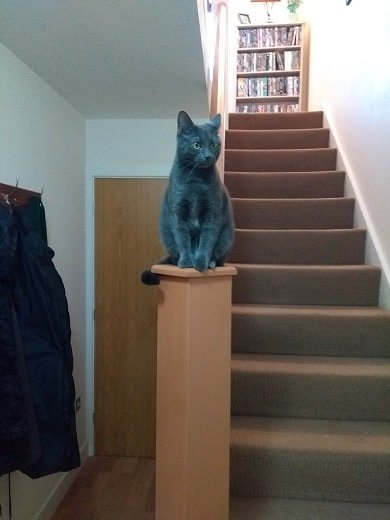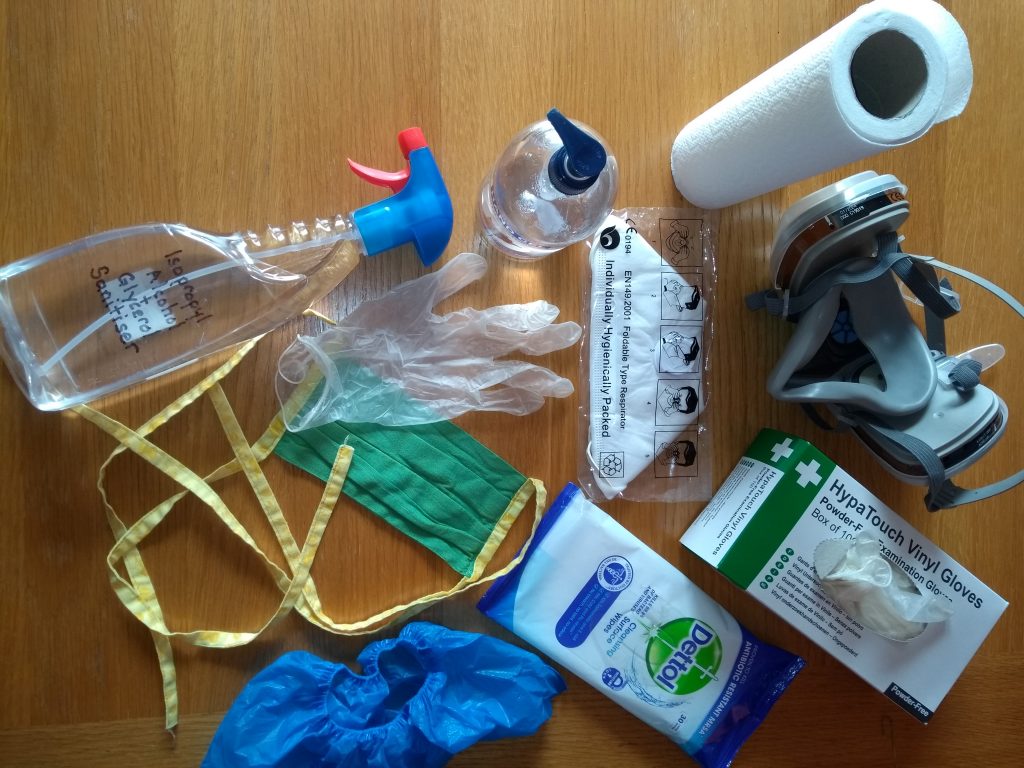Cat Sitting For A Coronavirus Patient

It is unlikely that you will need someone to provide cat sitting during the Coronavirus pandemic. People almost always only require a cat sitter’s service when they are travelling for work or heading off on holiday. In line with the rest of the travel industry, the Government’s mitigation lockdown rules have reduced cat sitter bookings virtually to zero.
I say ‘virtually’ because on occasion we are asked to provide cat sitting cover for someone who is being admitted to hospital. And very rarely we might even be called upon to do the same for someone who has already been admitted, i.e. there is an emergency.
I have taken calls from relatives of our clients, telling me that the client is in hospital and requesting that as their key holder, I need to provide pet care cover for them until further notice. It should be noted that the next of kin were only able to contact us because of the forethought of these clients. The clients had passed on our details to them in anticipation of just such an emergency.
In these rare situations we are able to provide cover because:
a. we hold the key.
b. we know the pet(s) and importantly, the pet(s) know their sitter.
c. we hold detailed written instructions on caring for the pet(s).
d. we have a signed agreement with the client to enter the property, (which also means we are insured).
How prepared are you for an emergency where control is taken out of your hands?
What If I Have SARS-CoV-2, (Covid-19)?
First of all make sure you have given your contact details to all of the right people. Then consider who is going to be your key holder and who will be the person who knows your pet(s) well enough and is willing to enter a Covid-19 house to look after them.
If you don’t do that, (and I strongly suggest you begin doing it right now), you are left with the Government’s single sentence of advice for someone in your, (Covid-19), situation:
Following this advice will involve a stranger in full Personal Protective Equipment, (PPE) entering your house to look after your pet(s) while you are in hospital. From the point of view of your pet(s) this is a harrowing experience in which they will display fear and possibly fear aggression. Not only will your pet(s) be afraid but also they will most likely be very hungry. Why? Because this person will not risk entering the house until 72 hours have passed since you were last there. 72 hours is the time period that the virus is thought to remain active on surfaces such as your kitchen counter, door knobs and so on. 72 hours is the length of time your pet(s) will be left before the RSPCA will enter your house – to collect them for rehousing..
Here’s an article from the Manchester Evening News: “Three dogs and a bird had to be rescued from house after owner taken to hospital with coronavirus symptoms.”
If you don’t want this to happen, you need to prepare now.
Some Background..
The task of cat sitting during the Coronavirus pandemic presents new and difficult challenges. It is a big ask for someone to come into your Covid-19 house while you are in hospital. So it is important that you and they are aware of what is involved.
SARS-CoV-2, (Coronavirus), which causes the disease Covid-19, is highly transmissable, rapidly infectious, quite persistent as an aerosol and very persistent on some hard, smooth surfaces.
Fortunately, on pet fur, which is fibrous and porous, it is thought that the SARS-CoV-2 gets trapped in the hair making it much less transmissible through contact events with pets.
There has been some preliminary evidence however which indicates that cats (and ferrets) may be susceptible to infection by SARS-CoV-2. In a test report, (not yet peer reviewed), it was found that the virus could transfer between cats via respiratory droplet, i.e. airborne infection. In the same report, traces of the virus were also found in cat faeces.
A caveat to the previous paragraph: It should be emphasised that this was a preliminary paper originally puiblished before its peer review. In light of this, the World Small Animal Veterinary Association (WSAVA), was prompted to note a lack of evidence in this respect:
“While we do not yet know for sure, there is limited evidence that companion animals can be infected with or spread SARS-Cov-2. We also do not know if they could get sick from this new coronavirus. Additionally, there is currently no evidence that companion animals could be a source of infection to people. This is a rapidly evolving situation and information will be updated as it becomes available.” (dated 20 March 2020)
I would advise you to keep checking the WSAVA website for updates.
It is also important not to confuse Coronavirus SARS-CoV-2 with the highly infectious feline coronavirus (FCoV) which causes infectious peritonitis in cats. However it might be worth noting the reported results of a comparison test of cat-litters: Dust-free, Fullers earth based, clumping litters were found to greatly reduce the transmission of the FCoV virus between cats in multiple cat households. Sawdust based litters were least effective at reducing transmission.
So, Things For You To Do..
While you are still well you should provide your cat sitter with the food or at least a list of the foods your cat usually eats. Make out a list of instructions that you consider important. Provide health, medicinal & veterinary details. Note where things can be found in the house. Explain the confinement situation of your pet(s). Be honest about any faults in the house – these are booby-traps to your cat sitter: a door knob which is not secure, a tap which leaks etc. Be sure to leave next of kin contact details so that they can get updates on your condition and report on your cat(s).. And finally, tell your cat sitter what, in the event of your death, your preference is for the future of your cat.
The general advice regarding cat sitting during the coronavirus pandemic is that you should if at all possible keep your cat in the house throughout the pandemic period.
Should you feel yourself falling ill and before your illness gets worse, certainly try to ensure that your cat is kept indoors. Contact your next of kin and contact your key holder/cat sitter. Your cat sitter should then regularly phone/text you to check on your condition, (so keep your phone charged!)
Put down enough cat food to last 24 hours.
If you can manage this next bit and can do it without letting the cat back out, try to ventilate the house. Then close off as many rooms as you can. Especially your bedroom if that is where you have been spending most of your time.
By doing this you are protecting your cat sitter.
Your cat sitter must begin their job only when they know you have been admitted to hospital. It is vitally important that the message: “I am in hospital” gets to them. This is because it is extremely unsafe for your cat sitter to walk into your house while you are still inside. So keep them informed about what is happening.
Advice To The Cat Sitter..
Cat sitting during the Coronavirus pandemic presents new and difficult challenges. Did I say that already?
I am assuming you don’t need to be instructed about how to look after a cat under normal circumstances. So let’s directly address the additional measures you need to take to protect yourself with regard to a Covid-19 house and its animals.
The first thing you must do is wait. Wait for as long as you can before going into the property. It can take 3 hours for aerosol virus to fall out of the air in an enclosed environment. If you can put your first visit back 24 hours then that will not only remove the aerosol risk but the extended time lag will also reduce the total amount of active virus lying around on surfaces.
The volume of SARS-CoV-2 particles on a smooth plastic surface reduces by half every 7 hours (this is its ‘half-life’). So after 14 hours the ‘viral load’ on the surface will be one quarter of what it was when the patient went into hospital. (See: Surface Half-Life)
Should you become infected, the lighter the ‘viral load’ in your body the better are your chances of experiencing mild, non-life-threatening symptoms of the Covid disease.
Visiting A Covid-19 House
I am not going to advise on disinfection materials. We should all by now have learnt enough about 60% alcohol based sanitisers, anti-viral wipes/cleaners and detergents.
So..
Identify an area, preferably on a hard surface or floor just inside the front door of the Covid-19 house that you are visiting. Try to make it somewhere that the cat(s) can’t or aren’t likely to access. Disinfect that area. That is now your ‘clean area’ for this visit. It is somewhere to put down things that you have brought into the house.
If the cat(s) are able to access the ‘clean area’ during your absence, this area will need to be disinfected each time you make a visit.
Be highly vigilant about what you are coming into contact with. Assume that every door knob, drawer handle, tap, wash bowl and every surface is infectious and must be disinfected before you touch it. Your hands (or your gloved hands), need disinfecting after each bout of cleaning.
For the first few days you should keep your visits to the Covid-19 house as brief as possible.
Prepare food in a bowl before you enter the property. Leave any old food bowls in place. Don’t wash them. You can worry about cleaning them once 3 days have passed. Likewise, If it looks like you can get away with not emptying the litter tray – then leave it for now. You could even bring a pre-prepared fresh tray with you. At this early stage you should also consider not refreshing any water bowls but just top them up with some bottled water you have brought with you.
As much as you might be tempted to, you should not interact with the cat(s) especially at this early stage. If the cat(s) have lain on an infected surface just prior to your arrival the virus could have transferred to their coat(s). Whilst it is unlikely that you can contract it from there, the precautionary measure is that the virus remains viable for 72 hours.
Having said that, you may have to handle an animal if you need to administer any medicines. The pet owner should have directed you on how they would normally do this. Nevertheless an animal may become distressed during the procedure and you may need to restrain them using a towel to wrap down their forpaws. I would wear a mask and eye protection and because there is some small but unproven risk that cats can shed the virus, I would continue to wear this ppe each time I administered the medication.
Please also note that you cannot contract Covid-19 directly into the bloodstream. So do not panic if a cat scratches you. Just treat the wound as you would normally.
On leaving the property, decide what cleaning equipment (etc.), you want to leave behind in the ‘clean area’. Disinfect everything else that you are taking with you – including house keys, car keys..
If you are getting into a car assume the car is clean and that you are now the dirty thing carrying virus into the car. You need a clean area on which to put the newly cleaned things – the passenger seat?
Getting out of the car: assume that everything you have touched is now dirty – steering wheel, handbrake, gear knob, door handles seat and headrest. These can be cleaned or left for the virus to degrade via its surface half-life.
For professional pet-sitters.. here’s the rub. You cannot now just carry on with your rounds. These early visits to a confirmed Covid-19 house must be made separately from any other pet visits or dog walks. You will need to go home and decontaminate.
When you get home you will need to remove all of your top clothing – consider it as infected. It will need to be washed. And before you do anything else you will need to shower. (A point about showering: Assume that your hair is carrying virus. So you want to thoroughly shampoo it without letting water run down your face. Once you have done that, you can continue to shower normally.)
I believe this is enough information to get you through the first 3 days of cat sitting in a covid-19 house – although I am about to make some reference to PPE below.
After 72 hours (3 days), the understanding is that any surface virus will have degraded and you should be able to relax your procedures to some degree. My personal view on this is that the jury seems to be out regarding the possibility of cats contracting and transmitting SARS-CoV-2. And I personally will continue to observe cautionary measures beyond 72 hours. On precautionary principle, I certainly will not be allowing a cat to lick me unless and until more definitive evidence reports that cats are not carriers and transmitters of the virus.

Personal Protective Equipment – PPE
Once again I am going to speak personally about this – you can take from it what you will.
In a normal day I travel from house to house walking dogs, feeding cats, ferrets, chickens. I clean out terrapin aquariums, rabbit hutches and so on – you get the picture?
Careful hygiene and sanitising between visits is just normal practice. Cat sitting during the Coronavirus pandemic has added an edge to my normal procedures.
Below is a list of what I am now carrying with me in my car for use and wear as seems necessary. Please be aware that there are procedures for the donning and doffing of some PPE. Please research this for yourself if you intend to use it. Here by way of example, is a link to instructions on how to correctly handle, put on and take off a facemask.
Commercial hand sanitiser
Pure isopropyl alcohol spray
W.H.O. recipe hand rub which I use either neat for cleaning my hands and with kitchen roll for cleaning various items that I need to handle:
((Recipe: • Isopropyl alcohol 99.8%: 7515 ml • Hydrogen peroxide 3%: 417 ml • Glycerol 98%: 145 ml) (For the sake of my skin I have replaced half of the Glycerol with Aloe Vera gel.))
Anti-viral wipes
Kitchen towels
Nappy bags/poop bags
Large & small bin bags
Single use vinyl gloves
Disposable overshoes
Eye protection
Washable reusable facemask
Updates
I will update this article on cat sitting during the Coronavirus pandemic as and when new data becomes available. If you find anything that you could add or which you believe to be incorrect in the article please don’t hesitate to contact me.
22 April 2020: CDC Confirmation of COVID-19 in Two Pet Cats in New York
For more information on professional cat sitting from Paws Indoors click here


Leave a Reply
You must be logged in to post a comment.